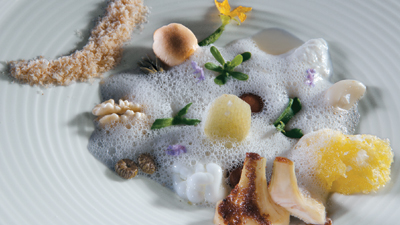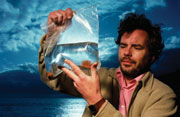Chemistry in the Kitchen
Q&A: Chemistry in the kitchen
Jascha Hoffman
Voted the world's best restaurant, Spain's elBulli near Barcelona offers an unusual culinary experience, from hot velvet-crab aspic with mini-corncob couscous to ice-cold liquorice nitro-dragon dessert. Innovative head chef Ferran Adrià explains how science and haute cuisine can work together.
Ferran Adrià's 'Folie' salad combines tuna-oil foam, air-bag dough and yoghurt nodules.
What will a guest find at elBulli?
It's not just about the food, it's an experience in itself. Cooking is a language. I'm expressing myself and everyone perceives it in a different way, like a piece of theatre. Each person takes away something new. In most human activities it would be normal to find humour, irony and deception. The one place this isn't expected is in the kitchen.
What are you doing now?
At the moment my team and I are working with a very strange ingredient, veal cartilage. We're also designing a new version of the Chinese 'thousand-year-old egg' [traditionally an egg preserved in clay, salt, ash, tea and lime]. I spend half the year composing at my workshop in Barcelona, and the other half interpreting in the kitchen at elBulli.
How hard is it to develop new dishes?
Last year we ran 4,000 tests and only about 300 of them panned out. Everyone learns from their mistakes — it's a necessary consequence of being creative. The important thing is to have lots of ideas simmering. Some of these ideas will work, and from these we build our new dishes.
Do you ever seek advice?
As with any other art, when my creative team needs something specific we go to an expert such as a scientist or historian. But when it comes to everyday ingredients, we don't usually consult researchers. Our work is systematic: you have to be very organized to achieve a sense of anarchism. It's not possible to grasp our work without seeing it for yourself — it would be like trying to describe eating an Amazonian fruit you've never tried.
Where do you find new ingredients?
I recently went to the Amazon, which has incredible fruits, some of them unknown to science. Under jungle conditions, many fruits ferment naturally. I also studied them in museums, in markets and with biologists.
Has your work raised any scientific questions?
It is having an influence in the world of science. I visited the physics department at Harvard University last month to talk about this. The dialogue between science and cooking is not new. Bread making has been considered a chemical process for hundreds of years, and the food industry has relied on chemists for almost a century. But only recently has there been a dialogue between science and haute cuisine.
A Day At elBulli
by Ferran Adrià, Albert Adrià & Juli Soler
Phaidon Press: 2008. 600 pp. £29.95

